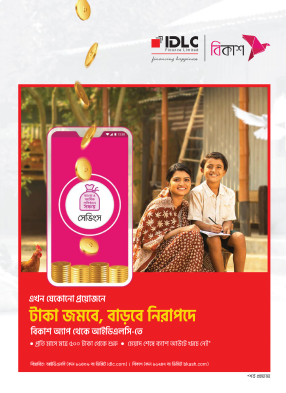- info@ficci.org.bd
- |
- +880248814801, +880248814802
- Contact Us
- |
- Become a Member
- |
- |
- |
- |
- |
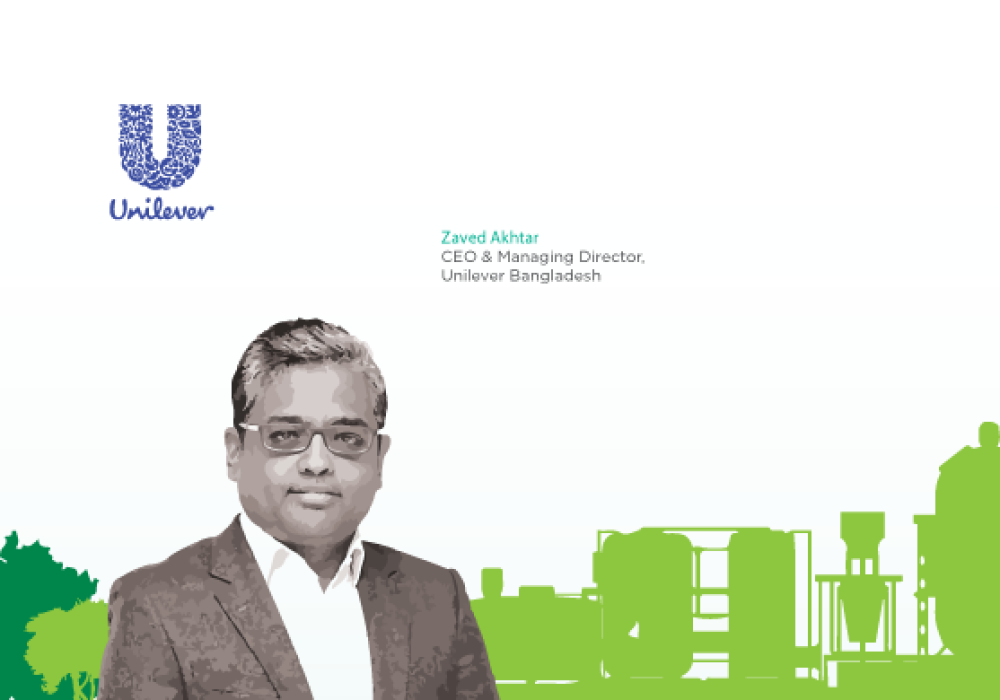
The world we live in today is in two polar ends. On one hand, we have seen a massive progress in education, health, and poverty reduction. On the other hand, there has been a steady degradation of nature and the environment. Economic development, social progress and technological disruption have changed our perspective and lifestyle. Today, consumers are more informed, more empowered, and to some extent, more demanding, and rightfully so. As consumers are seeking more convenient solutions to meet their lifestyle requirements, we are seeing more product innovations and formats. To meet the growing consumer demand and to reach more people with quality products, manufacturers are using diverse types of plastic packaging to ensure supply chain efficiency and cost-effectiveness. Plastic for us is a blessing since it is our tool to reach more people with quality products. For example, if we did not have access to flexible packaging, reaching the bottom of the pyramid with value packs would never have been possible. Plastic gives us the flexibility and effectiveness demanded by the market to take the right product, to the right market, in the right quantity.
Plastic has become an indispensable commodity in our life and its usage has gradually been increasing. According to UNEP, one million plastic bottles are purchased every minute around the world, while up to five trillion plastic bags are used worldwide every year. However, this practice has caused the creation of a throwaway culture globally. Approximately 36 per cent of all plastics produced are used in packaging, including single-use plastic products for food and beverage containers, and UNEP research suggests that up to 85 percent of these plastics end up in landfills or as unregulated waste. The study also reveals that if this trend continues, the level of greenhouse gas emissions associated with the production, use and disposal of plastic is forecasted to grow to 19 percent of the global carbon budget by 2040
Even in Bangladesh, we are seeing a rapid increase in plastic waste. According to the World Bank, Bangladesh’s annual per capita plastic consumption in urban areas tripled to 9.0 kg in 2020 from 3.0 kg in 2005. Of the 977,000 tonnes of plastic used in 2020, only 37 per cent were properly collected in Bangladesh.
Sustainable waste management starts with 3Rs – Reduce, Reuse and Recycle, and Unilever is constantly working with innovation and research to champion this. In our new sustainable business strategy, the Unilever Compass, improving the health of the planet and creating a waste-free world is a core pillar of our business, and we believe that a good business needs to take care of the environment. Globally, we have set ambitious targets for addressing plastic pollution, which are: 50% virgin plastic reduction by 2025, 25% recycled plastic by 2025, and collection and processing more than we sell by 2025. We are transforming our approach to plastic through our “Less Plastic, Better Plastic, No Plastic” framework, and are rethinking how we design our packaging to either use less virgin plastics or eliminate the use of plastic altogether
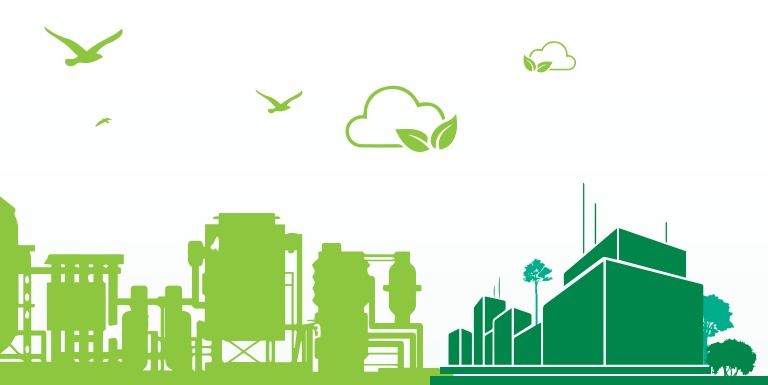
In Unilever Bangladesh, to meet the 100% better plastic goal by 2025, our ambition this year is to become 100% technically ready and be in 80% implementation. To meet the 50% less plastic goal by 2025, we have the target of ~25% virgin plastic reduction (vs 2018 baseline) and achieved ~10% till now. On virgin plastic reduction through PCR, technical readiness is achieved for many of our product packagings, such as hand wash and body wash. Our R&D team is bringing changes to our packaging to reduce the plastic we use and use recyclable plastic when available. Our new Vim 1 litre bottles have 33% less plastic, the new Lifebuoy handwash bottle 18% less plastic, and we have removed most of the foil from the inside of our Glow & Lovely creams, among others
To tackle the root causes of plastic waste we need to think differently about packaging. In June 2022, we introduced the first-ever refill machine in the country for dispensing liquid products to reduce plastic use through technology and behaviour change. The refill machine allows anyone to refill of Rin and Vim liquid at a discounted rate by bringing an empty container and old Rin or Vim bottle. We also know that for low to mid income generating people, we must invent even simpler technology to make it easy for adoption, so we are also working with an organisation named BopInc (Bottom of the Pyramid International) to create a refill machine that will serve the needs of the low-income population. By making refill and reuse formats more widely available, accessible, and affordable, we hope to use our scale and reach to drive lasting change.
The lack of a holistic plastic waste management policy, which is inclusive of all stakeholders, an unstructured recycling industry, and a throw-away culture among consumers all contribute to the current challenge of mismanaged plastic waste in Bangladesh. However, the government and business organisations have already started taking steps to address these problems. The Government of Bangladesh has taken progressive steps to manage plastic waste, starting from 2002 when Bangladesh became the world’s first country to ban plastic shopping bags. Managing plastic pollution will be important for attaining Bangladesh’s vision of becoming an upper-middle-income country by 2031. Sustainable waste management is one of the priorities of the government’s Vision 2041 and thus the government is introducing different regulations and policies to make positive interventions to improve the waste management situation. One of these regulations is the Solid Waste Management Regulations 2021, under the Bangladesh Environmental Protection Act, 1995 which outlines the responsibilities of the Local Government as well as businesses (brand owners) in solid waste management. The regulation also encourages 3R (Reduce, Reuse and Recycle) of waste materials, which is a timely and prudent move of the government.
With our global targets to reduce plastic in our environment and Unilever being a committed partner in Bangladesh’s growth journey, we started our journey of collecting post-consumer used plastic waste. We were unsure how to start as we did not have enough data or experience in this regard, but we were driven to start the project, hence, under our multistakeholder partnership model, we wanted to join hands with partners who are also committed to addressing the same issue. We started an ambitious three-year-long project of waste collection in the city of Narayanganj in 2020, in partnership with the Narayanganj City Corporation, UNDP and Eco-Social Development Organization (ESDO). The project titled ‘Plastic Waste Management: Building Circular Cities’, has the aim to create a circular economy model for plastic waste, with a specific focus on Single-Use Plastics (SUP) and flexible packaging, which are the major problem of NCC, since SUP makes up about 40%-50% of the total plastic used in Narayanganj, but negligible amounts of SUPs are recollected or recycled. Through the project, we are creating a business model with a value proposition for each actor involved in the plastic waste value chain.
In the initial phase of our project, a total of three different models have been evaluated to collect plastic waste from NCC. First, under the Waste Picker Model, waste pickers, who collaborate with private companies, collect plastic waste from city households separately. Second, under the Street Cleaner Model, the city corporation appointed street cleaners to collect single-use plastic and flexible packaging that are found in the NCC streets. Finally, the third model, the ‘Recovery Model’, is where informal collectors recover plastics from the landfill areas.
In our project, we expanded our coverage to all twenty-seven wards of NCC and are targeting to collect one thousand tonnes of plastic in 2022. The NCC Mayor, Selina Hayat Ivy herself is engaged and is playing a vital role in the process by forming a committee to ensure the smooth execution of the project.
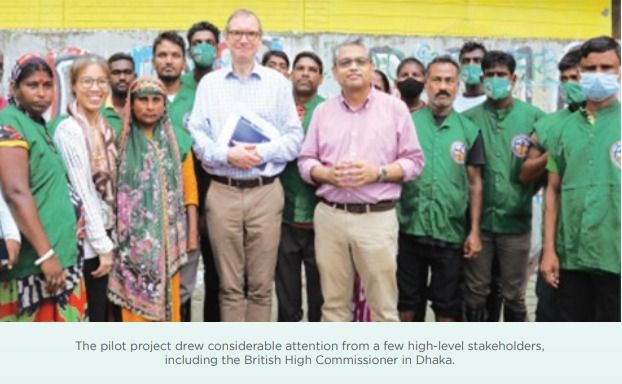
Our project in NCC took more than 2 years to gain momentum, partly because of COVID-19, but also because of our learning process, since this project is the first of its kind that involves all the stakeholders of the plastic collection value chain. As I reflect on the past two years, I would like to share some of our learnings:
1. Hypothesis can vary from reality: Our plans were mostly based on hypotheses in the project design phase. However, after our baseline study and experiences from the ground, we realised that our initial plan would not give us the results we wanted. Through our 18 months of the learning curve, we realised that plastic collection and ground-level value chain development of a plastic collection were not our expertise, so we onboarded a partner to do the work on the ground, which helped us to focus more on identifying different stakeholders in the value chain and working together
2. Stakeholder mapping is critical: We spent a considerable amount of time mapping out our stakeholders, starting from the city council to local recycling businesses. This helped us to bring everyone on a common platform
3. A baseline study is always useful: For example, we found out that the collection infrastructure was much smaller than we thought. There were only 212 waste pickers in the entire city of around twenty lac households! So, a single waste picker must visit 200-250 households per day to cover the entire city. Without this information, the team could not have created awareness of the various kinds of plastic that there are and why they should spend time collecting and segregating them, especially since flexible plastic did not have much monetary value.
4. Consumers have a pivotal role to play: When the consumers segregate waste in their household, the process of overall segegation becomes much simpler. Furthermore, with more awareness of the consequences of plastic pollution, they can also take steps to reduce, reuse and recycle, further reducing plastic pollution from the household source.
5. Behaviour change takes time: Even though we are working to raise awareness and change people’s behaviour towards plastic consumption and disposal for more than 2 years, this is just scratching the surface. A good example is the Bangladesh government’s success in handling natural disaster and drastically reducing the number of causalities. In the ‘80s, hundreds of thousands of people used to perish in natural disasters such as floods and cyclones. However, it took over the last three decades, the government created an infrastructure and awareness system with the active participation of the citizens, and this has drastically reduced the casualties. It is important to understand that behaviour change needs to be driven with proper insight, through the collaboration of businesses and the government, and with citizens’ participation.
6. Behaviour Change Communication (BCC) and segregation need to go hand in hand: By running BCC campaigns and acting on them at the same time, households will get to practice their newfound knowledge at the same time
7. One size does not fit all: Each city has separate ways of functioning, with different stakeholders who need personalised approaches to tackle the same issue we face nationally. Thus, it is important to reflect on key lessons in one city but customised to the local context.
With our learnings from the project in Narayanganj, we quickly learned what worked and what did not. We looked inwards and reflected on how we can play to our strengths, which is building and growing a business.
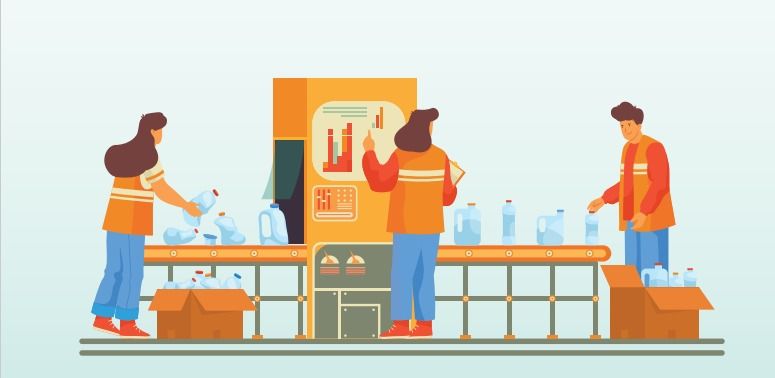
When we expanded our project in Chattogram, we took on a new partner, Young Power in Social Action (YPSA), and helped them strengthen their business acumen. They also played to their strength of having a strong understanding of their community and how to mobilize them, working with the public representative, as well as working with the local actors. Together, we identified the actors in the value chain and connected them with each other. We also decided to naturally create value addition by disseminating information about the value of plastic and building the capacity of the informal actors. This is resulting in a bigger volume of plastic collection. By playing to each of the organisation’s individual strengths and with the cooperation of the Chattogram City Council, the project is showing an impressive result so far. We are hopeful that this will give us more learning in the coming future
In our plastic collection project, we recognise that challenging problems need a disruptive solution, and young people have a complete range of fresh and innovative ideas. Therefore, we were keen to collaborate with budding entrepreneurs who were willing to experiment and have the willingness to work from a different angle. In our partnership with two start-ups—Garbageman and Circular in Dhaka, we learned that although their willingness to work is tremendous, the problem that they are facing is even more massive. Just financing them is not enough, they need mentorship and guidance to get the courage to face the formidable task. Hence, we are spending a large amount of time working closely with the founders on how to run a business—from recordkeeping to finding a seller for the product, how they are investing, and what is the value of the investment.
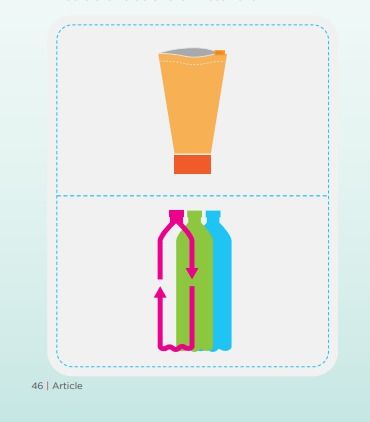 By taking all these initiatives, we are advocating for systems change to keep plastic in the loop. However, plastic pollution is too big for us to solve alone. In Bangladesh, fighting plastic waste will become more important for us as our government wants to change the waste management scenario of Bangladesh drastically as part of Vision 2041. For that, we all need to collaborate and invest to build sustainable national and regional waste collection models. Businesses need to move to recycling packaging and take an active part in Extended Producers Responsibility (EPR) that will be introduced by the government soon. We also need to bring all formal and informal actors into the value chain and work to create a world-class recycling infrastructure. The informal nature of the industry is a big challenge for us. The working condition and the health and safety measures for waste pickers need urgent addressing by the Government, businesses, NGOs, and donors so that we can ensure that the right measures are taken to ensure proper healthcare and human rights for them.
By taking all these initiatives, we are advocating for systems change to keep plastic in the loop. However, plastic pollution is too big for us to solve alone. In Bangladesh, fighting plastic waste will become more important for us as our government wants to change the waste management scenario of Bangladesh drastically as part of Vision 2041. For that, we all need to collaborate and invest to build sustainable national and regional waste collection models. Businesses need to move to recycling packaging and take an active part in Extended Producers Responsibility (EPR) that will be introduced by the government soon. We also need to bring all formal and informal actors into the value chain and work to create a world-class recycling infrastructure. The informal nature of the industry is a big challenge for us. The working condition and the health and safety measures for waste pickers need urgent addressing by the Government, businesses, NGOs, and donors so that we can ensure that the right measures are taken to ensure proper healthcare and human rights for them.
The Government shall play a crucial role in creating a collaborative and supportive ecosystem. The policies on plastic waste management should be progressive. When EPR will be introduced, a logical framework should be developed for the brand owners to get involved in plastic waste collection, strict regulation should be implemented to stop the use of non-recyclable packaging materials, plastic recycling businesses should be incentivised, and rewards such as tax incentives can be given to the businesses for using recycling plastic. Furthermore, city corporations need to create a waste management plan by including all their key stakeholders, sharing best practices from businesses and other cities, and customising a plan that will play to their strengths.
The government can also play a crucial role in encouraging consumer and end-user behaviour change as most of the waste is generated at the consumption level. The role of consumers in addressing waste is pivotal and we need to instill the right practices among them – to segregate waste in their households, practice the 3Rs and choose products or brands that are more responsible. By switching to more environmentally friendly brands or brands that use sustainable packaging, the waste at the source level will decrease considerably and the consumers will also make more informed decisions, keeping the environmental impact of their consumption in mind. Eventually, they will also become advocates of waste reduction and environmental change, encouraging their peers to engage as well.
Finally, FICCI can play a leading role here because they have access to global knowledge, best practices, and the collective capability to initiate the dialogue. Only by joining hands and collaborating to contribute to the green growth strategy of the government, will we be able to leave behind a safe and thriving world for our future generations
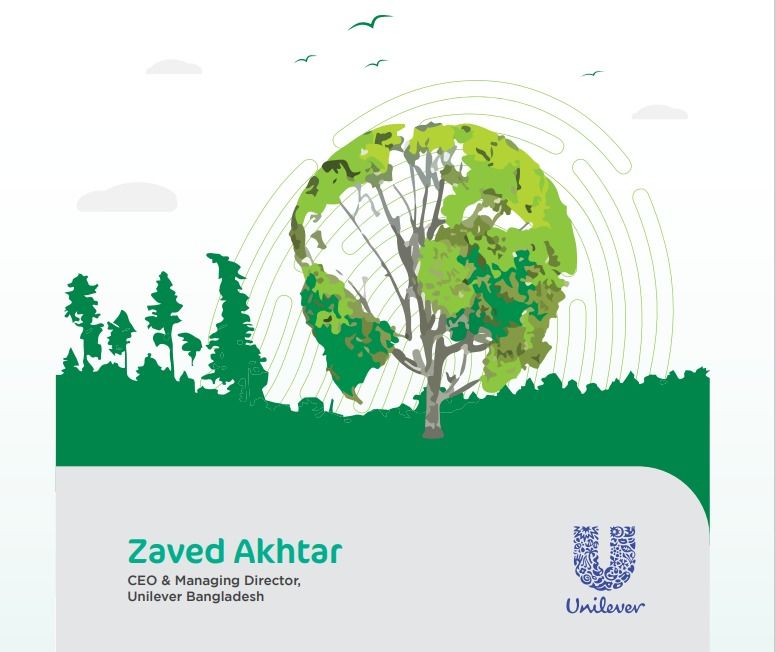
Zaved Akhtar joined Unilever in 2000 after 3.5 years in British American Tobacco, and in a career spanning more than 20 years in Unilever. He has worked in multiple categories across Bangladesh, India and the Philippines, demonstrating the ability to thrive across different cultures. From Regional Brand Innovation Manager for Dirt is Good (India), Marketing Manager – Skin (Bangladesh), Marketing Manager - Home Care & Oral (Philippines), Regional Brand Director, Deos Asia to Brand Building Director (Bangladesh), Zaved carries rich international experience in brands, innovation, communication development and business management. In his recent role as VP, Digital Transformation & Growth, Zaved has set up and led the Digital Council for Hindustan Unilever and anchored the ‘Reimagine HUL’ agenda, which is widely recognised across Unilever as a comprehensive end-to-end digital transformation program with impact. Zaved has also been an integral part of Hindustan Unilever team crafting the Five Fundamentals of Growth, Institutionalising Market Development and driving Net Revenue Management in Unilever’s business in South Asia.


